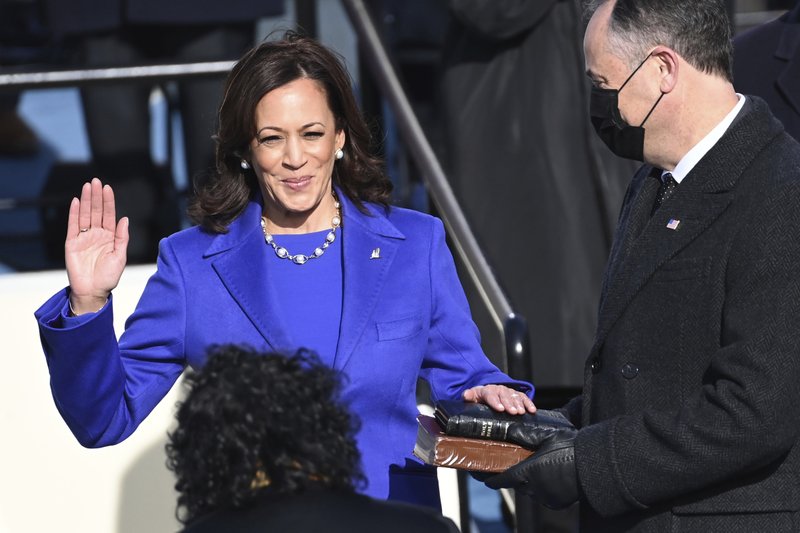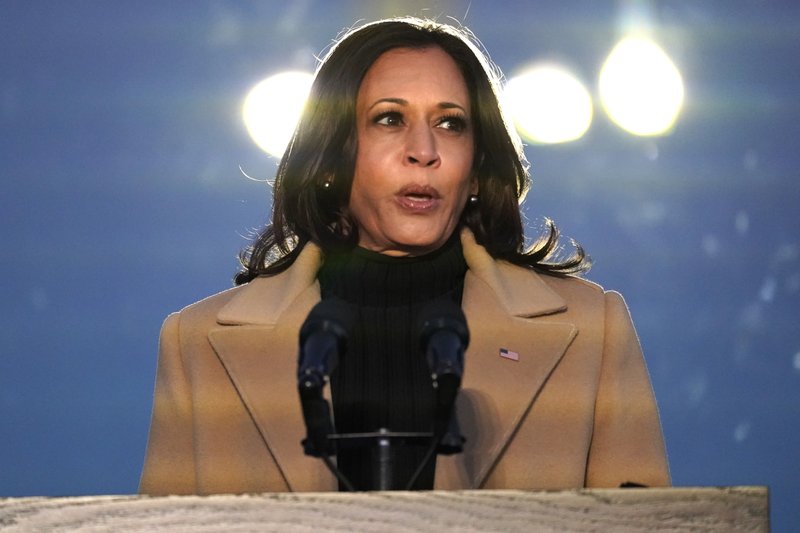

Vice President Kamala Harris broke the barrier that has kept men at the top ranks of American power for more than two centuries when she took the oath Wednesday to hold the nation’s second-highest office.
Hours after she was sworn in as the first female U.S. vice president — and the first Black woman and person of South Asian descent in the role — she cast the moment as one that embodied “American aspiration.”
“Even in dark times we not only dream, we do. We not only see what has been, we see what can be,” she said in brief remarks outside the Lincoln Memorial. “We are bold, fearless and ambitious. We are undaunted in our belief that we shall overcome, that we will rise up.”
For Harris, the day was steeped in history and significance in more ways than one. She was escorted to the podium by Capitol Police Officer Eugene Goodman, the officer who single-handedly took on a mob of Trump supporters as they tried to breach the Senate floor during the Capitol insurrection, and she was sworn in by Supreme Court Justice Sonia Sotomayor, the first woman of color on the court, on a Bible that once belonged to former Supreme Court Justice Thurgood Marshall. She wore a deep purple dress and coat created by two emerging Black designers.
Her rise is historic in any context, another moment when a stubborn boundary falls away, expanding the idea of what’s possible in American politics. But it’s particularly meaningful because Harris takes office at a moment when Americans are grappling over institutional racism and confronting a pandemic that has disproportionately devastated Black and brown communities.
Those close to Harris say she’ll bring an important — and often missing — perspective to the debates on how to overcome the many hurdles facing the new administration.
“In many folks’ lifetimes, we experienced a segregated United States,” said Lateefah Simon, a civil rights advocate and longtime Harris friend and mentee. “You will now have a Black woman who will walk into the White House not as a guest but as a second in command of the free world.”
Harris — the child of immigrants, a stepmother of two and the wife of a Jewish man — “carries an inter sectional story of so many Americans who are never seen and heard.”

For more than two centuries, the top ranks of American power have been dominated by men almost all of them white. That ends on Wednesday.
Kamala Harris will become the first female vice president — and the first Black woman and person of South Asian descent to hold the role.
Her rise is historic in any context, another moment when a stubborn boundary will fall away, expanding the idea of what’s possible in American politics. But it’s particularly meaningful because Harris will be taking office at a moment of deep consequence, with Americans grappling over the role of institutional racism and confronting a pandemic that has disproportionately devastated Black and brown communities.
Those close to Harris say she’ll bring an important — and often missing — perspective in the debates on how to overcome the many hurdles facing the incoming administration.
“In many folks’ lifetimes, we experienced a segregated United States,” said Lateefah Simon, a civil rights advocate and longtime Harris friend and mentee. “You will now have a Black woman who will walk into the White House not as a guest but as a second in command of the free world.”
Harris — the child of immigrants, a stepmother of two and the wife of a Jewish man — “carries an intersectional story of so many Americans who are never seen and heard.”
Harris, 56, moves into the vice presidency just four years after she first went to Washington as a senator from California, where she’d previously served as attorney general and as San Francisco’s district attorney. She had expected to work with a White House run by Hillary Clinton, but President Donald Trump’s victory quickly scrambled the nation’s capital and set the stage for the rise of a new class of Democratic stars.
Her swearing-in comes almost two years to the day after Harris launched her own presidential bid on Martin Luther King Jr. Day in 2019. Her campaign fizzled before primary voting began, but Harris’ rise continued when Joe Biden chose her as his running mate last August. Harris had been a close friend of Beau Biden, the elder son of Joe Biden and a former Delaware attorney general who died in 2015 of cancer.
The inauguration activities will include nods to her history-making role and her personal story.
She’ll be sworn in by Supreme Court Justice Sonia Sotomayor, the first woman of color to serve on the high court. She’ll use two Bibles, one that belonged to Supreme Court Justice Thurgood Marshall, the late civil rights icon whom Harris often cites as inspiration, and Regina Shelton, a longtime family friend who helped raise Harris during her childhood in the San Francisco Bay Area. The drumline from Harris’ alma mater, Howard University, will join the presidential escort.
She’ll address the nation late Wednesday in front of the Lincoln Memorial, a symbolic choice as the nation endures one of its most divided stretches since the Civil War and two weeks after a largely white mob stormed the U.S. Capitol in an effort to overturn the election results.
“We’re turning the page off a really dark period in our history,” said Long Beach, California, Mayor Robert Garcia, a Harris ally. As Democrats celebrate the end to Trump’s presidency, Garcia said he hopes the significance of swearing in the nation’s first female vice president isn’t overlooked.
“That is a huge historical moment that should also be uplifted,” he said.
Harris has often reflected on her rise through politics by recalling the lessons of her mother, who taught her to take on a larger cause and push through adversity.
“I was raised to not hear ‘no.’ Let me be clear about it. So it wasn’t like, “Oh, the possibilities are immense. Whatever you want to do, you can do,’” she recalled during a “CBS Sunday Morning” interview that aired Sunday. “No, I was raised to understand many people will tell you, ‘It is impossible,’ but don’t listen.’”
While Biden is the main focus of Wednesday’s inaugural events, Harris’ swearing-in will hold more symbolic weight than that of any vice president in modern times.
She will expand the definition of who gets to hold power in American politics, said Martha S. Jones, a professor of history at Johns Hopkins University and the author of “Vanguard: How Black Women Broke Barriers, Won the Vote, and Insisted on Equality for All.”
People who want to understand Harris and connect with her will have to learn about what it means to graduate from a historically Black college and university rather than an Ivy League school. They will have to understand Harris’ traditions, like the Hindu celebration of Diwali, Jones said.
“Folks are going to have to adapt to her rather than her adapting to them,” Jones said.
Her election to the vice presidency should be just the beginning of putting Black women in leadership positions, Jones said, particularly after the role Black women played in organizing and turning out voters in the November election.
“We will all learn what happens to the kind of capacities and insights of Black women in politics when those capacities and insights are permitted to lead,” Jones said.